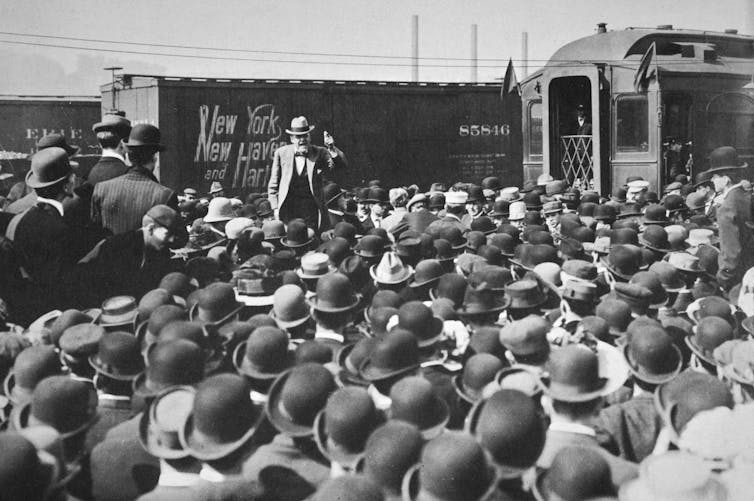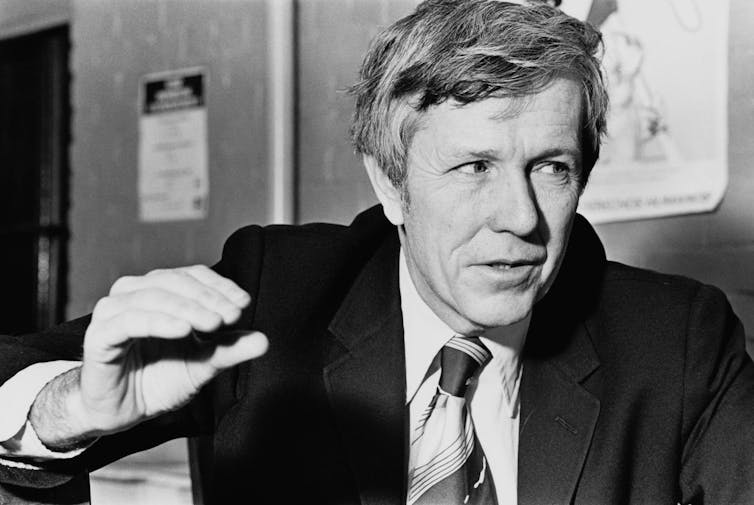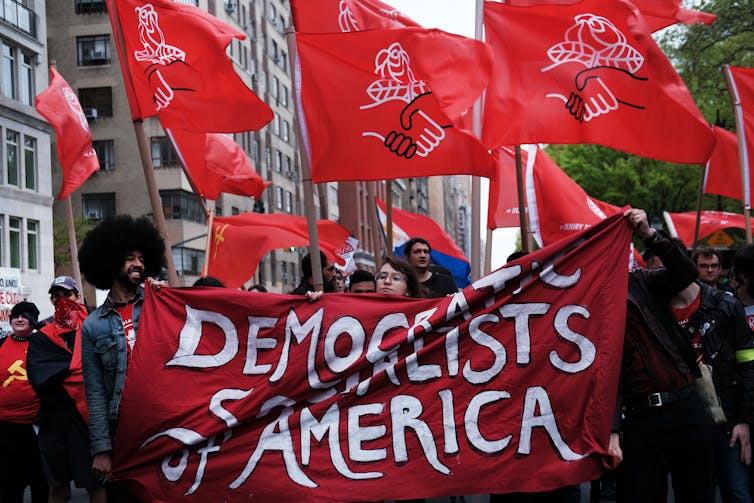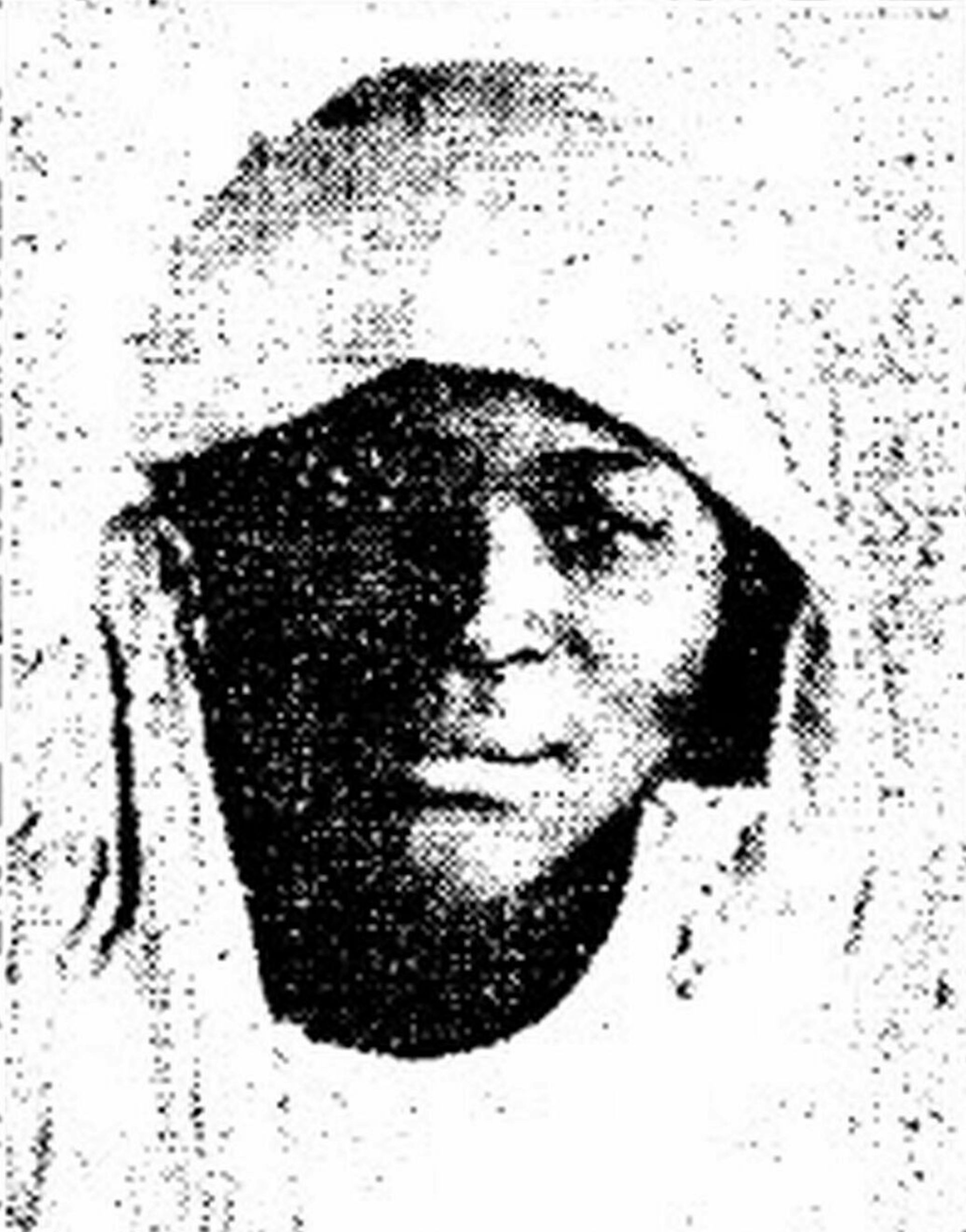How 'socialism' stopped being a dirty word for some voters – and started winning elections across Am
The leftist Democratic Socialists of America was tiny before the 2016 election. Now, with 90,000 dues-paying members and four seats in Congress, the DSA is upending Democratic politics nationwide.

The leftist Democratic Socialists of America, which helped congressional star Alexandria Ocasio-Cortez get elected in 2018, looks to be a big political player again in New York City’s 2021 municipal elections.
The group has not yet endorsed anyone for mayor – the top prize in New York’s June 22 Democratic primaries. But all 51 city council seats are up for grabs this year, and the DSA has members running for six of them – including Queens public defender Tiffany Cabán and Brooklyn tenant activist Michael Hollingsworth.
With two state senators and five representatives out of 213 lawmakers, the New York State Legislature already has the country’s largest DSA legislative caucus. These Democrats share a leftist platform that includes guaranteeing housing as a human right and ending mass incarceration
The DSA has upended local politics in this Democratic stronghold, and its wins extend well beyond New York – into Virginia, Nevada and beyond. How did socialism jump from the fringes of American politics into its very center?
American socialist history
The DSA’s roots trace back to the Socialist Party of America, which was formed in New York in 1901 to promote such issues as establishing an eight-hour workday and public ownership of utilities like water and electricity.

Writer Upton Sinclair, Christian theologian Reinhold Niebuhr and Planned Parenthood founder Margaret Sanger were prominent early members. But many early American socialists were Jews and Eastern European immigrants – groups that were considered well outside mainstream “white” society at the time.
My research as a historian of American socialists finds that early 20th-century socialists found electoral success by running candidates who represented the economic and racial diversity of their communities and championed the issues that mattered to working-class, immigrant constituencies.
In 1918 – the heyday of New York’s socialist caucus, when socialists held 10 of 121 seats in the State House – socialist politicians were teachers, settlement house lawyers and union leaders. They proposed New York’s first birth control bill, allowing advocates to give women educational pamphlets about contraception, and put forward programs to create old-age insurance and rent control.
The Socialist Party began losing members to the growing Communist Party in the 1930s. By the mid-20th century, it had responded to Americans’ growing anticommunism with a rightward turn. In 1972, party leaders actually renamed the party the Social Democrats, USA because so many people associated the word “socialist” with America’s great antagonist, the Soviet Union.
The DSA, past and present
Disillusioned, the activist and Marxist professor Michael Harrington left the organization and in 1973 formed the Democratic Socialist Organizing Committee, which later merged with another leftist group, the New American Movement, to form the Democratic Socialists of America.
Unlike the Socialist Party of America, which was a registered political party and ran candidates on its own ticket, the DSA is a political group. Harrington wanted to create the “left wing of the possible” within the Democratic Party.

For four decades, DSA members have mostly run in Democratic primaries, attempting to push the party leftward – on the Iraq War and NAFTA, for example – while endorsing Democratic presidential nominees from Walter Mondale to Barack Obama.
It had some early local successes. From the 1980s to the early 2000s, DSA members were elected to city councils nationwide and won mayoral races in liberal college towns like Berkeley, California; Ithaca, New York; and Burlington, Vermont, where longtime DSA member Bernie Sanders was mayor from 1981 to 1989.
In 2016, Sanders ran for president. His campaign, coupled with Donald Trump’s subsequent victory, created a surge in DSA membership among young voters. The group’s median age dropped from 68 in 2013 to 33 by 2017. The DSA now claims over 90,000 dues-paying members, up from 6,000 in 2015.
The DSA’s electoral strategies also changed after 2016, partly due to the influx of new members and partly in frustration with mainstream Democratic candidates.
In Democratic primaries across the country, DSA candidates ran to replace older, centrist, white incumbents with young leftists who promised to fight for “Medicare for all” and to “hold elected officials accountable.”
It was a winning strategy for the Trump era. Since 2016, DSA-backed candidates have won district attorney races from Philadelphia to Travis County, Texas, and hold four seats in Congress. Forty DSA members sit in 21 state legislatures. DSA members hold five of Chicago’s 50 city council seats.
The professional backgrounds of today’s DSA legislators resemble those of their forebears. New York State Sen. Jabari Brisport, elected in 2020, was a teacher and tenant organizer. New York State Rep. Phara Souffrant Forrest was previously a tenant organizer and nurse.
The DSA’s legislative proposals – rent control, free college and reproductive rights – are classic socialist issues, updated for the 21st century. The Democratic Party has now embraced many of these proposals, but moderates like West Virginia Sen. Joe Manchin have not.

As in the past, the DSA tends to back candidates from marginalized groups – whether African American, Caribbean, South American or South Asian – who reflect the racial makeup of the neighborhoods they represent.
Angry Dems and DSA infighting
The DSA’s growing political profile has caused tensions within the Democratic Party.
Shortly after DSA-backed candidates in March 2021 swept all five leadership positions in the Nevada Democratic Party, many longtime party staffers quit rather than work under the new leftist leadership. But first, according to the Nevada Independent and other local newspapers, the Democratic staffers transferred US$450,000 from the DSA-controlled Nevada Democratic Party coffers into the Democratic Senatorial Campaign Committee, which is controlled by the National Democratic Party.
Some DSA policies that diverge sharply from the Democratic party line – such as its support for the movement to boycott, divest from and sanction Israel for its militarized occupation of the Palestinian territories – draw fierce criticism from other Democrats.
The DSA has also been accused of having a “race problem.” Despite running primarily candidates of color, the organization’s leadership is largely white and male. Some DSA members say the group silences the concerns and voices of people of color.
After new groups arose within the DSA to recruit more Black leaders, the DSA’s national committee announced in February 2021 that it would start an initiative to better attract, mentor and retain people of color.
In the 20th century, American socialism cracked under the weight of infighting and social change. Can the modern DSA survive its 21st-century challenges?
Its next test is in New York City on June 22.
[Get the best of The Conversation, every weekend. Sign up for our weekly newsletter.]
Joshua Kluever does not work for, consult, own shares in or receive funding from any company or organization that would benefit from this article, and has disclosed no relevant affiliations beyond their academic appointment.
Read These Next
Iran-US nuclear talks may fail due to both nations’ red lines – but that doesn’t make them futile
The US administration may sense that Iran is weak and ready to do a deal. But negotiations could be…
In World War II’s dog-eat-dog struggle for resources, a Greenland mine launched a new world order
Strategic resources have been central to the American-led global system for decades, as a historian…
Revisiting the story of Clementine Barnabet, a Black woman blamed for serial murders in the Jim Crow
In 1912, a young Black woman’s supposed religious beliefs were quickly blamed to make sense of a terrifying…





